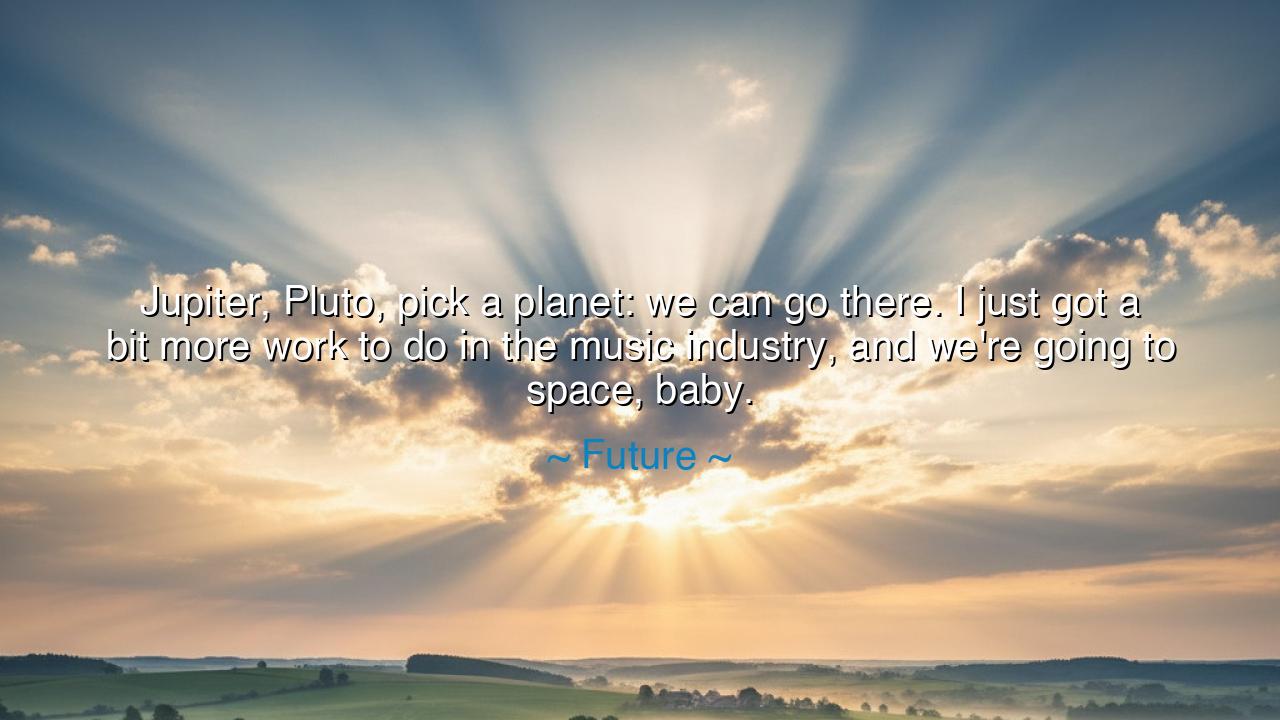
Jupiter, Pluto, pick a planet: we can go there. I just got a bit
Jupiter, Pluto, pick a planet: we can go there. I just got a bit more work to do in the music industry, and we're going to space, baby.






Hear the bold words of the artist called Future, whose voice carries both defiance and vision: “Jupiter, Pluto, pick a planet: we can go there. I just got a bit more work to do in the music industry, and we’re going to space, baby.” In these words, though wrapped in the sound of modern swagger, lies a timeless truth: the human spirit was never meant to remain bound by earth alone. With toil, with artistry, with perseverance, man may rise beyond his station and reach toward the infinite. This is not merely talk of planets and stars, but of limitless ambition, of daring to dream beyond what seems possible.
The planets he names—Jupiter and Pluto—are more than worlds in the sky. They are symbols of the unreachable, of the farthest heights of aspiration. To declare, “we can go there,” is to proclaim that no frontier is closed to those who labor and believe. Future ties this cosmic vision to his earthly craft: he must yet complete his work in the music industry, for his music is his vessel, his rocket, his ladder to the heavens. In his art, he builds the wings by which he and those who follow him might rise. Thus, his boast becomes a parable: through mastery of one’s gift, one earns the power to transcend all limits.
We see this truth echoed in history. Consider the tale of Yuri Gagarin, the farm boy from Russia who became the first man to journey into space. He was not born into privilege, nor was he given the heavens as inheritance. Yet by dedication, training, and faith in his cause, he ascended beyond the clouds to circle the earth. His cry, “Poyekhali!”—“Let’s go!”—resounds like Future’s “we’re going to space, baby.” Both are shouts of joy, defiance, and destiny, where the impossible becomes reality through will and labor.
The quote also reminds us that greatness does not happen at once. Future says, “I just got a bit more work to do.” This is humility beneath the bravado. Even the boldest dreams demand patience and toil. Before a ship can cross the sea, its hull must be built plank by plank. Before an empire of thought can rise, the mind must labor in silence. So too, before one can soar to Jupiter or Pluto—whether in song, in science, or in spirit—one must finish the work at hand. Dream vast, but complete your daily task.
From these words flows a lesson for all who hunger for greatness: do not fear to set your sights high, even to the heavens. But know that such heights are reached not by leaps of fancy, but by steady steps, by honing your craft, by remaining faithful to your path. The stars do not yield themselves to the lazy. They shine only for those who labor, who sacrifice, who dare to proclaim that their destiny is larger than the world around them.
And yet, remember too the communal call of his words: “we’re going to space, baby.” He does not speak of himself alone, but of his people, his listeners, those who journey with him. True greatness is not the lonely ascent of one man, but the lifting of many together. Just as explorers once carried the hopes of nations in their ships, so too does the artist carry the dreams of his community in his rise. To say “we” is to say: my victory shall be yours as well.
Therefore, let this teaching be carried forward: name your Jupiter, your Pluto, your far-off frontier. Let it be a dream that stirs your blood, that pulls you forward even when the road is long. Commit yourself to your craft, to your daily work, for it is the vessel that will carry you there. And when you rise, rise not alone, but with your brothers and sisters, with your family, your people, your community. For the stars are not meant for the few, but for all who dare to claim them.






AAdministratorAdministrator
Welcome, honored guests. Please leave a comment, we will respond soon